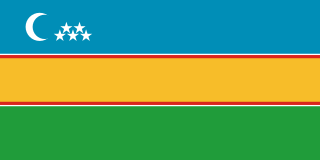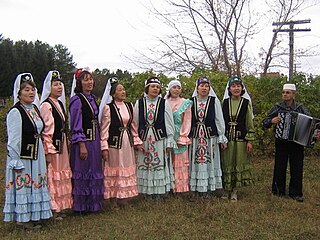 W
WAzerbaijanis in Uzbekistan are part of the Azerbaijani diaspora. They are Uzbek citizens and permanent residents of ethnic Azerbaijani background. Azerbaijan and Uzbekistan used to be part of the Russian Empire and later the Soviet Union. Currently there are over 35,848 Azerbaijanis in Uzbekistan, making up 0.15% of Uzbekistan's population.
 W
WBukharan Jews, in modern times more commonly called Bukharian Jews, are an ethnoreligious Jewish sub-group of Central Asia that historically spoke Bukharian, a Judeo-Tajik dialect of the Tajik language, in turn a variety of the Persian language. Their name comes from the former Central Asian Emirate of Bukhara, which once had a sizable Jewish population.
 W
WThe Chagatai are a Tajik ethnic group living in the Surxondaryo Region of southeastern Uzbekistan and in southern Tajikistan. They were estimated to number 63,500 in 1924–25. Together with the Kharduri, the Chagatai are one of the ethnographic groups of Tajiks who maintain a distinct identity. The origin of the people is unknown, although the name Chagatai is of Mongol origin, as Chagatai Khan was a son of Genghis Khan.
 W
WCrimean Tatars or Crimeans, are Turkic ethnic group and nation, who are an indigenous people of Crimea. The formation and ethnogenesis of Crimean Tatars occurred during the 13th–17th centuries, from Cumans that appeared in Crimea in the 10th century, with strong contributions from all the peoples who ever inhabited Crimea, including Greeks, Italians and Goths.
 W
WThe Gagauz are a Turkic people living mostly in southern Moldova and southwestern Ukraine (Budjak). Gagauz are mostly Eastern Orthodox Christians.
 W
WThe Karakalpaks or Qaraqalpaqs, are a Turkic ethnic group native to Karakalpakstan in Northwestern Uzbekistan. During the 18th century, they settled in the lower reaches of the Amu Darya and in the (former) delta of Amu Darya on the southern shore of the Aral Sea. The name "Karakalpak" comes from two words: "qara" meaning black and "qalpaq" meaning hat. The Karakalpaks number nearly 620,000 worldwide, out of which about 500,000 live in the Uzbek Republic of Karakalpakstan.
 W
WThe Kazakhs are a Turkic ethnic group who mainly inhabit the Ural Mountains and northern parts of Central and East Asia in Eurasia. Kazakh identity is of medieval origin and was strongly shaped by the foundation of the Kazakh Khanate between 1456 and 1465, when several tribes under the rule of the sultans Janibek and Kerey departed from the Khanate of Abu'l-Khayr Khan in hopes of forming a powerful khanate of their own. Other notable Kazakh khans include Ablai Khan and Abul Khair Khan.
 W
WLyuli or Jughi is an ethnic group living in Central Asia, primarily Tajikistan, Uzbekistan and Kyrgyzstan. They speak a Tajik dialect. The Lyuli practice Islam. They have a clan organization. Division into sub-clans is also practiced. The Lyuli community is extremely closed towards non-Lyuli.
 W
WSiberian Tatars, the indigenous Turkic-speaking population of the forests and steppes of Western Siberia, originate in areas stretching from somewhat east of the Ural Mountains to the Yenisei River in Russia. The Siberian Tatars call themselves Yerle Qalıq, to distinguish themselves from more recent Volga Tatar immigrants to the region.
 W
WTajiks are a Persian-speaking Iranian ethnic group native to Central Asia, living primarily in Afghanistan, Tajikistan, and Uzbekistan. Tajiks are the largest ethnicity in Tajikistan, and the second-largest in Afghanistan and Uzbekistan. They speak varieties of Persian, a Western Iranian language. In Tajikistan, since the 1939 Soviet census, its small Pamiri and Yaghnobi ethnic groups are included as Tajiks. In China, the term is used to refer to its Pamiri ethnic groups, the Tajiks of Xinjiang, who speak the Eastern Iranian Pamiri languages. In Afghanistan, the Pamiris are counted as a separate ethnic group.
 W
WThe Uzbeks are a Turkic ethnic group native to wider Central Asia, being the largest Turkic ethnic group in the area. They comprise the majority population of Uzbekistan but are also found as a minority group in: Afghanistan, Tajikistan, Kyrgyzstan, Kazakhstan, Turkmenistan, Russia, and China. Uzbek diaspora communities also exist in Turkey, Pakistan, Saudi Arabia, United States, Ukraine, and other countries.
 W
WThe Volga Tatars or simply referred to as Tatars are a Turkic ethnic group native to the Volga-Ural region of Russia. They are subdivided into various subgroups. Volga Tatars are Russia's second-largest ethnicity after the Russians. They compose 53% of the population of Tatarstan and 25% of the population of Bashkortostan. The Volga Tatars are by far the largest group amongst the Tatars.